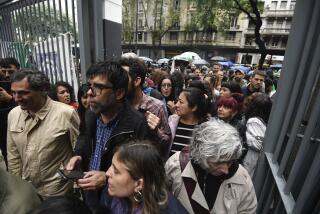France Takes 24-Hour Strike by Public Workers in Stride
PARIS — The major labor unions of France challenged Premier Jacques Chirac with a strike by public workers Tuesday but failed to gather enough support to paralyze the cities, as they had threatened, or to weaken his conservative government.
The 24-hour strike hampered public transportation but not enough to close down the Metro system. More than two-thirds of the subway trains were running by midday. Parisians usually judge the strength of a strike by how much it ties up the Metro.
But the French railways reported that only one out of four trains was running. And Air France said it would probably have to cancel 60% of its flights in Europe and to North Africa for the day. Air Inter, the domestic French airline, expected wholesale cancellations of flights.
Controllers to Cooks
The unions called out more than 5 million public workers, from air controllers to school cooks, in the strike, aimed at protesting the government’s plans to reduce its public work force and freeze many public salaries. It was the first such strike called by all the major unions since Chirac and his conservative coalition won the French parliamentary elections last March 16.
But while the main unions--the Communist General Confederation of Labor (CGT), the Socialist-influenced Democratic French Confederation of Labor (CFDT) and the centrist Force Ouvriere (FO)--joined in calling for a strike, they could not get together on a joint demonstration in Paris. All the unions paraded separately in the city during the day.
But there were a number of joint demonstrations in other areas of the country. “You must not confuse Paris and France,” Edmond Maire, general secretary of the CFDT, told journalists.
Maybe at Their Weakest
The response to the strike call, strong in some sectors but feeble in others, reflected the state of the labor movement in France these days. With the country caught in recession, the Communist and other leftist parties faring poorly in polls and an anti-ideological mood prevailing in the country, the labor unions may be at their weakest in decades.
The government-run television networks were hurt by the strike, and the three channels scheduled the same movie Tuesday night. Some radio stations canceled newscasts and substituted recorded music. The government said that 40% of its postal workers and 45% of its telecommunications operators had stopped work. Government electrical workers also went on strike, reducing the production of electricity by 30%. But there was no sudden cut in electricity. In Paris, officials said that half of the city buses were running.
More to Read
Sign up for Essential California
The most important California stories and recommendations in your inbox every morning.
You may occasionally receive promotional content from the Los Angeles Times.










